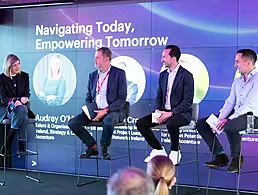The latest 4IRC debate discussed the value of 21st-century skills and lifelong learning. TechWatch editor Emily McDaid reports.
The Black Box was the venue for a lively discussion with policymakers, educators and students about how we should be educating our kids for the future. Held on Tuesday 10 April, this attracted one of the largest crowds in 4IRC debate history.
It covered topics such as:
- ensuring 21st-century skills are a part of the curriculum
- empowering both educators and students in the classroom
- why lifelong learning is important
Image: TechWatch
Speaker: Elizabeth Huddleson, principal, Bangor Grammar School
We employ skills-based learning to build resilience in our pupils.
A key aim of post-primary schools is to shape pupils into well-rounded, articulate, confident individuals who will not only survive but who will actively engage with the wider economy – but is this the case? Only to a certain extent.
Why? Because, after the Key Stage 3 curriculum – which is underpinned by development in skills – it becomes limited and restrictive and focused on academic performance to the detriment of skills development.
During Key Stage 3, the emphasis is very much on fun. Our boys are taught thinking skills; being creative, problem-solving, working with others, communication, using maths and ICT.
But, once a pupil reaches GCSE, they are studying a curriculum that hasn’t changed much in decades. Success is judged on rote learning, photographic memories and the ability to write under a time constraint. This system perpetuates an antiquated view of education. It could produce academically brilliant students, but they may lack the skills that make them employable.
At Bangor Grammar, we’ve made a number of changes to try to make our kids more prepared for the ‘real world’. We reviewed how we teach 870 boys – and boys learn in a slightly different way.
- Lessons used to be 35 minutes long; by the time books were out, you only had 10 minutes. So, we changed lessons to one hour, allowing for more active learning
- Peer presentations, where they give constructive feedback to each other, the way it would happen in the workplace
- More opportunities for group work, problem-solving
This restructuring has benefited all our pupils – senior pupils as well.
In addition, we focus on drama, the arts – these softer subjects are where skills for the workplace can be developed. This includes the development of confidence, ability to perform, adaptability and thinking creatively.
Given what I’ve just said, has the focus on STEM subjects been to the detriment of this skills development? Possibly. The new focus on STEAM is good.
Speaker: Andrew Douglas, education manager, CCEA
21st-century skills – that sounds interesting! What are the 21st-century skills? You can visit this site to see what they are.
Google’s Project Oxygen looked at 21st-century skills. It found that teams of people who hadn’t come from a STEM background had done very well; for example, in curiosity, emotional safety and team-building.
The skills in the Northern Irish curriculum are available on our website. They were developed in 2007 and include communication, using ICT and maths.
What do we need to do to make this a 21st-century skills curriculum? Just put the label ‘21st century’ on it? Creativity, critical thinking and problem-solving, communication, collaboration – these skills are all represented.
Do we need to change the way we teach? Firstly, it doesn’t look like we really need to change that much. We have classrooms that are dynamic, with digital tech and highly creative activities. But we also have a problem because society doesn’t measure success in softer skills. I don’t like that term, but the term ‘other skills’ is even worse.
At Key Stage 4, we have a focus on what society uses as a measure for success. How do you teach caring for others when a student is studying alone for an individual exam?
This idea of lifelong learning is important. Don’t expect someone who has come out of school at 17 or 18 to already be a complete package who will just slot in. Employers have a role in shaping skills, too.
Education shouldn’t just be readiness to work – people should benefit society as well.
Paul Hannigan. Image: TechWatch
Speaker: Paul Hannigan, president, Letterkenny IT
What do we think makes a good teacher? Everyone will have their own opinion of that. Think about whether you had a teacher who made a difference in your life. I had one, and really it was because she stretched us, gave us things that might have made us feel uncomfortable. She also saw that everyone in that classroom had something to offer – even kids who hated coming to school. She taught the 50 states of the US by having us sing the Perry Como song What did Delaware, Boys?
Those years were formative in terms of making us look at the bigger picture and what we could be achieving.
Recently, the North West Regional Skills Forum looked at tech skills and what people would need. It found: emotional intelligence, empathy, recognising other people’s needs.
If we crowd education too much, we miss out on the fun stuff. One thing my teacher had us do was write letters to The Irish Times – that’s the kind of thing we need to get back into the classroom, instead of everything being focused on the outcomes at the end.
What I say to students is, start to look at your CV from the bottom up – that’s the way employers look at it. They want to know, who is the person?
I’m not sure if we need to change the way we teach. But we need to give teachers the space to work in, give them the respect that teachers deserve. We need to take issues back into the home, and give teachers back the sanity they need. Persistence – maybe young people today give up a little bit easier than they used to.
Teaching is a privilege – that’s why I say it’s the greatest job in the world.
Image: TechWatch
Panel discussion
The three speakers were joined on a panel by Stephanie Gowdy, student recruitment senior manager at PwC, and Mark Nagurski, CEO of MakeMatic.
Do we need to change the way we teach?
Gowdy: At PwC, often I see that skills are there, but it’s hard to see them. Or, you take a candidate out of their safe zone into the corporate world and they don’t know how to cope. How do we make sure candidates recognise that they have key skills? Students often overlook good things on their CVs such as being captain of a rugby team or working part-time at Tesco.
Nagurski: Yes, we need to change the way we teach. To qualify that slightly, everything that’s been discussed is valid. At MakeMatic, we’re focused on teacher training. The vast majority of teachers don’t have the skills or confidence, or they lack training in some of the 21st-century skills. There are 40,000 teachers in Northern Ireland. If you want to create a world where all the students have all these great skills, you have to ask the question: how do you train the teachers? There are 50m teachers worldwide. Using video allows you to scale this up dramatically.
Comments from the audience
“Universities need to change how they are delivering their courses. They can absolutely reduce time; it doesn’t require the three to four years that it once did. Why does a business degree take four years when they’re only doing eight hours a week? Compress that down to two years and get more focus from the students.”
“Do we even need university?”
“You don’t need a degree at university to go into software development, for example.”
“How can industry support education?”
“National subscription: two words that will solve problems in education and politics in Northern Ireland.”
A lot of talk tonight has been about teaching students how to think (not what to think). How can we implement that more?
Douglas: You can do this. The Center for Teacher Thinking in Massachusetts has a framework for this. It’s about not giving the answer. That is the key – enquiry-based teaching, and not giving answers.
Huddleson: Sometimes, in my maverick moments, I say to the governors that we need to wipe out the curriculum. It should be all about problem-solving, training teachers to ask the right questions. It’s about removing assessment as it currently exists. If we could do that at Key Stage 4 and 5, we’d have even better products coming out of our school system.
Does it mean bringing back polytechnics?
Hannigan: I work in institutes of tech. It’s about a certain maturity that needs to happen in higher education.
Why isn’t there recruitment out of secondary school? Why do you have to go to university?
Gowdy: At PwC, we support the apprenticeship model. Starting in 2012, we recruited post-A-level students for full-time employment and they studied for qualifications in the evening. The DoE is making headway in changing perceptions around apprenticeships.
Nagurski: As an employer, I find that people don’t get the job because they have the qualification – it’s because of what they’ve done, their portfolio. Absolutely, 18-year-olds can apply for these jobs; however, no one is telling them to go out and get their portfolio built.
Do you think Northern Ireland could be a leader in our new education system?
Nagurski: Yes, because it’s small enough to do it. It’s a manageable number of people to retrain.
Hannigan: Right across Ireland, there’s a great focus on education and that’s our strength. While we criticise ourselves, there’s a lot that’s great. The bedrock is there to build upon.
Douglas: I genuinely believe we have one of – if not the best – curriculums in the world. On paper, we are awesome. The problem comes when you try to implement it. We had people over from Singapore – the number-one education system in the world – coming here to see what we do. Infrastructure could be modernised to help with group work, for instance.
Huddleson: Yes, with some changes. The assessment needs to change. The structure needs some change. There are too many schools in Northern Ireland. Close the schools that need to be closed. We have too many sectors. If you could deal with some of those wider issues and get some of the key players all joining up the dots together, we are there.
Gowdy: I think the better question is, what if we don’t lead the way? The scary truth is that we’ll be behind. We have to be leading, and the question is how we’ll tackle that.
By Emily McDaid, editor, TechWatch
A version of this article originally appeared on TechWatch




